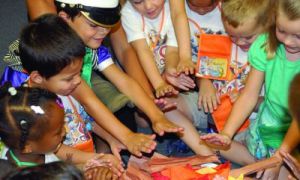

Early childhood educators are being unfairly targeted by fear-driven narratives and reactive policy changes, despite evidence showing they are among the safest and most dedicated professionals in the education system.
Despite the overwhelming volume of documentation educators are expected to complete, the National Law and National Regulations do not require endless observations, daily learning stories, or long‑form essays about children’s learning.
ACECQA’s own guidance for approved providers emphasises that documentation should be meaningful, authentic, and free from duplication, and that educators should use professional judgment when deciding what to record.
The National Regulations themselves focus on program visibility, child information, and records for safety and compliance, not excessive narrative documentation.
This template is a survey for educators about child safety, supervision, and safeguarding at the service.
Gossip is more than idle chatter; it’s a signal. In early childhood settings, where emotional labor runs high and relationships form the bedrock of quality practice, gossip can quietly unravel team cohesion. It erodes trust, fractures relationships, and creates emotional harm. But beneath the surface, gossip often reflects unmet needs, fear, and disconnection. The following article explores how restorative leadership can transform gossip into growth, offering practical strategies to rebuild emotional safety and team culture.
In the emotionally charged landscape of early childhood education, departmental decisions can feel final, overwhelming, and deeply personal. Whether it's a compliance breach, funding suspension, or licensing issue, educators often feel unheard, unsupported, and unsure of their rights. But procedural fairness is not a privilege—it’s a legal and ethical obligation. This guide aims to restore clarity, confidence, and emotional safety for those seeking to contest decisions with integrity and strength.
In the heart of every early childhood service is a director, someone who balances compliance with compassion, strategy with soul, and leadership with deep relational care. Directors Day, November 10th, is a chance to pause, reflect, and celebrate the incredible contribution these leaders make to children, families, educators, and the broader sector.
“Every time a child runs into my arms like I’m their whole world—that’s when I know I’m exactly where I’m meant to be.”
In early childhood education, empowered teams are the heartbeat of quality practice. When educators feel valued, heard, and supported, they don’t just comply—they co-create. Team empowerment isn’t a management strategy; it’s a relational commitment to emotional safety, shared purpose, and professional growth.
In the rhythm of early childhood education, the most meaningful moments often happen in the quiet spaces between routines—when educators kneel to listen, when a child’s story unfolds through play, when connection is felt rather than recorded. Yet across many services, the pressure to document every detail of a child’s day has grown into an unsustainable burden, pulling educators away from presence and into paperwork.
This article clarifies what educators are actually required to document under the Education and Care Services National Regulations—and what can be safely let go.
Toxic environments in early learning services can manifest as gossip, micromanagement, inconsistent policies, emotional invalidation, or even bullying. These psychosocial hazards are not just unpleasant—they’re legally and ethically significant under Work Health and Safety laws.
 Here is the list of the EYLF Learning Outcomes that you can use as a guide or reference for your documentation and planning. The EYLF… Read More
Here is the list of the EYLF Learning Outcomes that you can use as a guide or reference for your documentation and planning. The EYLF… Read More
 The EYLF is a guide which consists of Principles, Practices and 5 main Learning Outcomes along with each of their sub outcomes, based on identity,… Read More
The EYLF is a guide which consists of Principles, Practices and 5 main Learning Outcomes along with each of their sub outcomes, based on identity,… Read More
 This is a guide on How to Write a Learning Story. It provides information on What Is A Learning Story, Writing A Learning Story, Sample… Read More
This is a guide on How to Write a Learning Story. It provides information on What Is A Learning Story, Writing A Learning Story, Sample… Read More
 One of the most important types of documentation methods that educators needs to be familiar with are “observations”. Observations are crucial for all early childhood… Read More
One of the most important types of documentation methods that educators needs to be familiar with are “observations”. Observations are crucial for all early childhood… Read More
 To support children achieve learning outcomes from the EYLF Framework, the following list gives educators examples of how to promote children's learning in each individual… Read More
To support children achieve learning outcomes from the EYLF Framework, the following list gives educators examples of how to promote children's learning in each individual… Read More
 Reflective practice is learning from everyday situations and issues and concerns that arise which form part of our daily routine while working in an early… Read More
Reflective practice is learning from everyday situations and issues and concerns that arise which form part of our daily routine while working in an early… Read More
 Within Australia, Programming and Planning is reflected and supported by the Early Years Learning Framework. Educators within early childhood settings, use the EYLF to guide… Read More
Within Australia, Programming and Planning is reflected and supported by the Early Years Learning Framework. Educators within early childhood settings, use the EYLF to guide… Read More
 When observing children, it's important that we use a range of different observation methods from running records, learning stories to photographs and work samples. Using… Read More
When observing children, it's important that we use a range of different observation methods from running records, learning stories to photographs and work samples. Using… Read More
 This is a guide for educators on what to observe under each sub learning outcome from the EYLF Framework, when a child is engaged in… Read More
This is a guide for educators on what to observe under each sub learning outcome from the EYLF Framework, when a child is engaged in… Read More
 The Early Years Learning Framework describes the curriculum as “all the interactions, experiences, activities, routines and events, planned and unplanned, that occur in an environment… Read More
The Early Years Learning Framework describes the curriculum as “all the interactions, experiences, activities, routines and events, planned and unplanned, that occur in an environment… Read More

Creating a peaceful atmosphere during rest time is essential for children’s emotional regulation, relaxation, and...
See more...
In the NSW and VIC early childhood sector, safeguarding children and ensuring accountability in service...
See more...
Within early childhood settings and as part of the daily routine, group time has become...
See more...© 2009-2025 Aussie Childcare Network Pty Ltd. All Rights Reserved.

